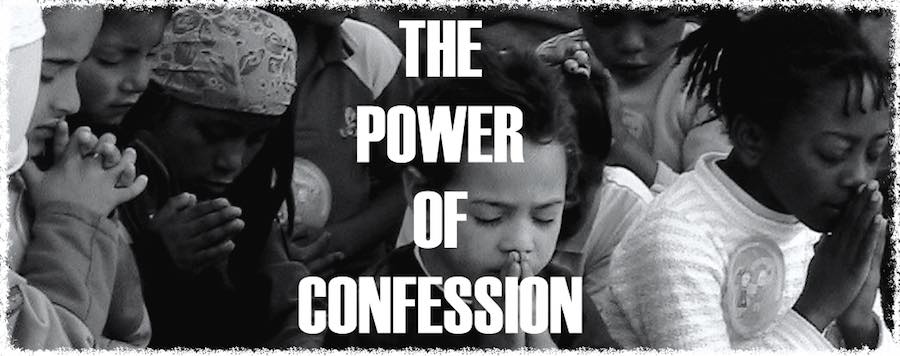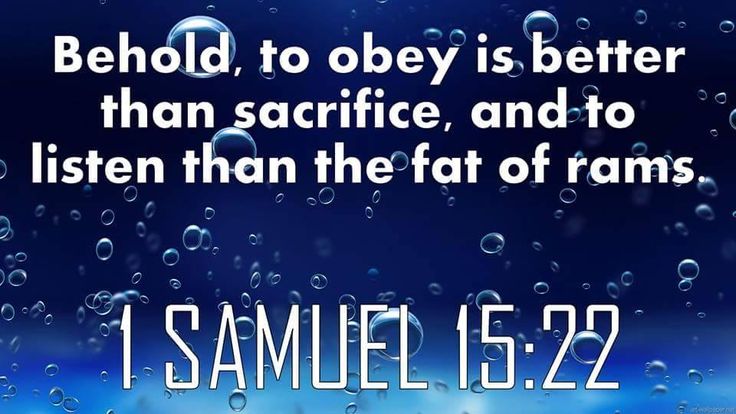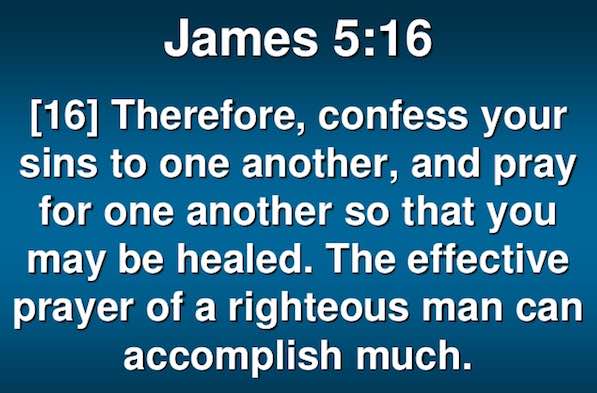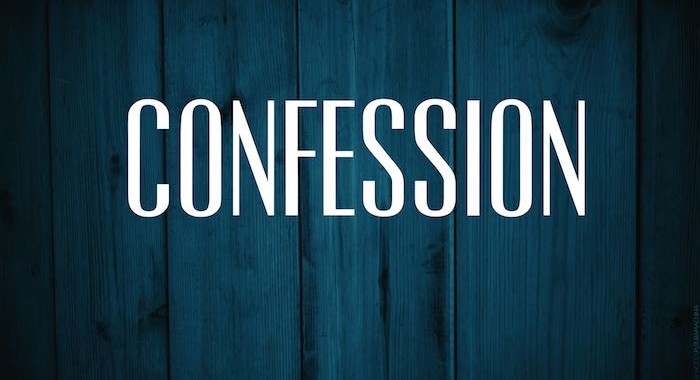There was a time in my life when I was very far from God. I didn’t understand who God was or how to know Him. I was lost and floating through life in a sea of confusion of thoughts and actions.
There were two specific people that had a tremendous influence on my coming to faith in God. These two people didn’t know each other but they both lived a life that was so powerful that they literally led me to faith in God and the Messiah through how they lived their lives. The most obvious characteristic that stood out to me in both of these men was their openness in confessing their sin. I had never really heard anyone talk so plainly about sin, outside of reading about it in the Bible.
I came to faith in God through the Messiah through the testimony of two different people who lived a life of open confession about their sin and their declaration of a holy God who had forgiven them. Their lives brought conviction to my life causing me to come to a place of confessing my own sin and believing on the finished work of the Messiah.
Is it possible to worship God without confession of sin?
The spiritual life of faith in Yeshua is often modeled as a life of worship through music, prayer, and Bible study. As I observe this, I must ask the question, Is it possible to worship God without confession? Is confession a one time event at the point of salvation and then simply a life of activity with other believers? Is it possible to worship God without confession of sin? I believe the answer to these questions is found in this week’s Torah Portion and related Scriptures.
Watch a brief video summary of this week’s commentary!
Intentional and Unintentional Sins
In this week’s study we begin to read the first five chapters in the book of Leviticus. The book of Leviticus provides instructions and details about specific sacrifices which were commanded for various reasons. In Leviticus chapters four and five there are specific instructions regarding sin and guilt sacrifices to be offered as a result of breaking the commands of God. In Leviticus chapter four all of the sin sacrifices which are listed correspond to the category of unintentional sins, whereas in Leviticus chapter five the guilt sacrifices listed include both intentional and unintentional sins.
According to the Law, both the person who sins unintentionally and the person who sins intentionally are required to bring a sacrifice for their sin in order to obtain forgiveness, however, only the person who sins intentionally is required to confess his or her sin:
So it shall be when he becomes guilty in one of these, that he shall confess that in which he has sinned. – Lev. 5:5
There is no direct biblical explanation for why this is so, however, the Bible is clear that the person who sins intentionally must confess his or her sin.
The word used for “confess” in this verse is the Hebrew word “התודה” – “hitvada.” One would naturally think that a spiritual word like “confess” or “confession” would be used hundreds of times in the Bible, however, it is only used four times in the Torah and 19 times in all of the Old Testament. Out of the four times which it is used in the Torah it is used twice in connection to corporate confession of sin (Lev. 16:21. 26:40) and twice in connection to individual confession of sin (Lev. 5:5. Num. 5:7). Does the infrequent use of the word “to confess” denote its lack of importance?
The Root of Confession
In further investigation of the word “confess” I found an interesting root. The Hebrew root of the word “להתודות” – “Lehitvadot” – “to confess” is the word “ידה” – “yada” which can mean: to revere or worship (with extended hands), to confess, to praise, to give thanks, to physically throw (a stone or an arrow), etc… It is fascinating to understand how the words “to worship,” “to confess,” “to praise,” and “to give thanks” all stem from the same Hebrew word. The vast majority of times that a form of the word “ידה” – “yada” is used in the Bible, it is used to mean “to praise” or “to give thanks.”
The first time that a form of the word “ידה” – “yada” appears in the Bible is in the naming of Jacob’s son, Judah (Yehuda):
And she conceived again and bore a son and said, “This time I will praise the LORD.” Therefore she named him Judah. Then she stopped bearing. – Gen. 29:35
After Leah bore her fourth child to Jacob she proclaimed “This time I will praise the LORD,” and the Hebrew word for the phrase “I will praise” is “אודה” – “odeh.” This word for praise is also the same root for the name “Judah” – “יהודה” – “Yehudah.”

Confession, Praise, & Thanksgiving
I believe that this connective root between the actions of confession, worship, praise, and thanksgiving exists to remind us that in order to properly give thanks and worship to the living God we must come to Him with confession on our lips.
We cannot effectively worship God and praise His name without properly confessing our own sin and coming to Him humbly, recognizing that He alone is God. Anyone who attempts to worship God without confessing his or her own sin is only putting on a show. There is a perfect example of a person who is zealous to worship God without confession in the Old Testament. This example appears in the additional readings for this Sabbath, Shabbat Zachor.
Shabbat Zachor
This particular Sabbath is a special Sabbath and it is called “Shabbat Zachor” – “The Sabbath of Remembrance.” Shabbat Zachor always precedes the celebration of Purim, which will be observed on March 24th-25th, 2016. This Sabbath of Remembrance which occurs the Sabbath before Purim is so named because we are to remember the command of God concerning the Amalekites:
Remember what Amalek did to you along the way when you came out from Egypt, how he met you along the way and attacked among you all the stragglers at your rear when you were faint and weary; and he did not fear God. Therefore it shall come about when the LORD your God has given you rest from all your surrounding enemies, in the land which the LORD your God gives you as an inheritance to possess, you shall blot out the memory of Amalek from under heaven; you must not forget. – Deut. 25:17-19
Amalek had attacked Israel unnecessarily and God commanded Israel to remember (“זכור” – “zachor”) this act of Amalek and destroy the Amalekites completely once they were settled in the Land of Israel.
It was approximately four hundred years later that this remembrance to destroy Amalek was issued. It occurred during the reign of King Saul:
Then Samuel said to Saul, “The LORD sent me to anoint you as king over His people, over Israel; now therefore, listen to the words of the LORD. Thus says the LORD of hosts, ‘I will punish Amalek for what he did to Israel, how he set himself against him on the way while he was coming up from Egypt. Now go and strike Amalek and utterly destroy all that he has, and do not spare him; but put to death both man and woman, child and infant, ox and sheep, camel and donkey.’” – 1 Samuel 15:1-3
The Kingdom of Israel was now established and it was time to bring the retribution of the LORD upon the Amalekites. God specifically commanded Saul to utterly destroy them and to leave no survivors, human or animal.
The Disobedience of Saul
Saul gathered together 210,000 men from all of Israel and Judah, however, Saul failed to execute God’s command as he was ordered:
But Saul and the people spared Agag and the best of the sheep, the oxen, the fatlings, the lambs, and all that was good, and were not willing to destroy them utterly; but everything despised and worthless, that they utterly destroyed. – 1 Samuel 15:9
Saul and the people of Israel spared Agag, the king of Amalek, and all of the best of the animals. God had given Saul a specific command to carryout but he chose instead to disobey the Word of the LORD.
The LORD told Samuel that He regretted having made Saul king as a result of Saul’s blatant turning his back on God. Samuel cried out to the LORD all that night and then set out to meet Saul the following day (1 Samuel 15:10-12). When Samuel arrived to the place where Saul was at, Saul proclaimed like he had fulfilled God’s command as specified:
Samuel came to Saul, and Saul said to him, “Blessed are you of the LORD! I have carried out the command of the LORD.” But Samuel said, “What then is this bleating of the sheep in my ears, and the lowing of the oxen which I hear?” Saul said, “They have brought them from the Amalekites, for the people spared the best of the sheep and oxen, to sacrifice to the LORD your God; but the rest we have utterly destroyed.” Then Samuel said to Saul, “Wait, and let me tell you what the LORD said to me last night.” And he said to him, “Speak!” – 1 Samuel 15:13-16
When Samuel confronted Saul with his deliberate disobedience he still did not admit his sin, but rather blamed the people and rationalized his sin of keeping the best of the flocks for the sake of sacrificing them to the LORD.
The conversation between Samuel and Saul is similar to a parent talking to a four year old child who is belligerent and unmoved concerning his sin, however Saul was a mature adult who was reigning as the King of Israel. Samuel explained to King Saul all the words of the LORD and confronted Saul for not utterly destroying the Amalekites and their livestock as God had commanded (1 Samuel 15:17-19). Nevertheless, Saul remained convinced of his innocence and would not admit to doing any wrong:
Then Saul said to Samuel, “I did obey the voice of the LORD, and went on the mission on which the LORD sent me, and have brought back Agag the king of Amalek, and have utterly destroyed the Amalekites. But the people took some of the spoil, sheep and oxen, the choicest of the things devoted to destruction, to sacrifice to the LORD your God at Gilgal.” – 1 Samuel 15:20-21
Saul himself admitted to leaving Agag, the king of Amalek, alive. As the King of Israel, Saul was ultimately responsible for all that happened in his kingdom. Even though he blamed the people for preserving the livestock, Saul himself justified their actions for the sake of providing animals to sacrifice to the LORD. Saul was anxious to worship the LORD but without confessing his own sin of breaking God’s command.
The Rejection of Saul
Samuel then responded to Saul’s belligerence with these famous words:
Has the LORD as much delight in burnt offerings and sacrifices
As in obeying the voice of the LORD?
Behold, to obey is better than sacrifice,
And to heed than the fat of rams.
For rebellion is as the sin of divination,
And insubordination is as iniquity and idolatry.
Because you have rejected the word of the LORD,
He has also rejected you from being king. – 1 Samuel 15:22-23
The LORD knew Saul’s heart and He had already rejected him from being king. Saul’s priorities were twisted. Saul somehow thought that the act of worship was supreme and that the more sacrifices that he could offer to God the more he would please God, however as Samuel proclaimed, “rebellion is as the sin of divination, and insubordination is as iniquity and idolatry.”

Saul was unable to recognize his sin and was lost in trying to please God according to his own standard. It was only at this point, after Samuel had explained that he would no longer be king, that Saul finally confessed that he had sinned against the LORD:
Then Saul said to Samuel, “I have sinned; I have indeed transgressed the command of the LORD and your words, because I feared the people and listened to their voice. Now therefore, please pardon my sin and return with me, that I may worship the LORD.” – 1 Samuel 15:24-25
Saul was afraid of losing his position as king before the people and begged Samuel to pardon his sin but it was already too late. Saul still wanted to worship the LORD but it was only as a show for the people as we read later in this account (1 Samuel 15:30-31).
There is no Real Worship without Confession
Samuel had refused to go to worship with Saul because he declared that God had rejected him. King Saul pleaded with Samuel until he agreed to go with him, however, this was only after Samuel declared to Saul that God had given the kingdom to someone else (1 Samuel 15:27-29).
The end of this tragic story reveals the heart of both Saul and Samuel:
So Samuel went back following Saul, and Saul worshiped the LORD.
Then Samuel said, “Bring me Agag, the king of the Amalekites.” And Agag came to him cheerfully. And Agag said, “Surely the bitterness of death is past.” But Samuel said, “As your sword has made women childless, so shall your mother be childless among women.” And Samuel hewed Agag to pieces before the LORD at Gilgal.
Then Samuel went to Ramah, but Saul went up to his house at Gibeah of Saul. Samuel did not see Saul again until the day of his death; for Samuel grieved over Saul. And the LORD regretted that He had made Saul king over Israel. – 1 Samuel 15:31-35
Saul supposedly “worshipped the LORD” but it was meaningless because he didn’t understand the root of worship and how it is connected to confession of sin. Samuel, on the other hand, honored God fully by completing what God had requested and killed Agag the king of Amalek. To obey is better than sacrifice.
Saul, the Amalekites, & the Connection to Purim
It is worth noting that God had a reason for ordering the complete destruction of the Amalekites unbeknownst to Saul. Saul’s mercy to the Amalekites nearly led to the complete destruction of the Jewish people.
God had commanded Saul to utterly destroy Amalek but he failed in this mission. Even though Samuel killed Agag, the king of Amalek, a descendant of Agag must have been spared because we read in the book of Esther that Haman, the man who sought to destroy the whole Jewish race, was a descendant of Agag (Esther 3:1). The celebration of Purim remembers God’s Providence in revealing the evil plot of Haman the Agagite and saving the Jewish people (Esther 9:20-32).
The life of Saul reminds us that disobedience to God’s Word is evil in His sight. When we realize that we have sinned we must confess it, agree with God that we have transgressed His holy command, and do that which is right in His sight. God makes the rules and not us. We need to obey His holy law and be quick to confess our sin when we realize that we have transgressed His command. Confession and worship are of the same root and cannot be separated. We cannot have relationship with God or worship Him without confession.

Confession is Agreement with God
The New Testament testifies to this truth that confession lies at the foundation of our relationship with God:
If we confess our sins, He is faithful and righteous to forgive us our sins and to cleanse us from all unrighteousness. If we say that we have not sinned, we make Him a liar and His word is not in us. – 1 John 1:9-10
Relationship with the living God demands that we confess our sins to Him and agree with His holy standard. A life without confession is a life that mocks God and calls Him a liar.
I honestly believe that all believers in Yeshua as the Messiah are called to live a life of confession, meaning that we need to confess our sins daily to God and also confess our sins to one another when appropriate. In the book of James we read the following exhortation:
Therefore, confess your sins to one another, and pray for one another so that you may be healed. The effective prayer of a righteous man can accomplish much. – James 5:16
This verse is in the context of physical healing but I also believe it is a general exhortation to healthy body life (in the body of believers). We are called to live a life of confession.
Confession and Worship
It is not possible to worship God without living a life of confession. Confession is the door that allows us to enter into relationship with God and puts us in the proper position to worship Him. It is only when we confess our sin that we can come into His presence to worship Him.



Good word, I agree confession is a part of worship. On another note I have a question about a small statement in the reading this week that I was hoping to get your thoughts on.
And the LORD regretted that He had made Saul king over Israel. – 1 Samuel 15:31-35
What is your opinion on this statement. If God knows everything before it’s going to happen why would He do something He regrets? This characteristic of God has always baffled me. Any thoughts on this?
Hi Suzanne,
Good question. My understanding is that God is all powerful and all knowing but He has created us with the freedom to choose. We see this from the very beginning in the Garden of Eden. We could ask the same question regarding creating Adam and Eve: Why did God ever create them if He knew that they would sin and fail? God is love and in love is freedom and with freedom comes accountability. In the same way, God appointed Saul to be king of Israel but Saul turned from God and God regretted that He had made him king.
I hope this helps.
Blessings,
Daniel
It’s a good reminder to me. It is so true that if we don’t confess our sin we even cannot stand before Him. And for me, when I confess my sins it often leads to natural worship. According to how much I recognize my sins, I receive grace from God. And I always feel that I am not deserving of His amazing grace.
And it’s also interesting to see the root of confession-praise-Yehudah. I will pray for Israel to become the nation of confession and praise/worship.